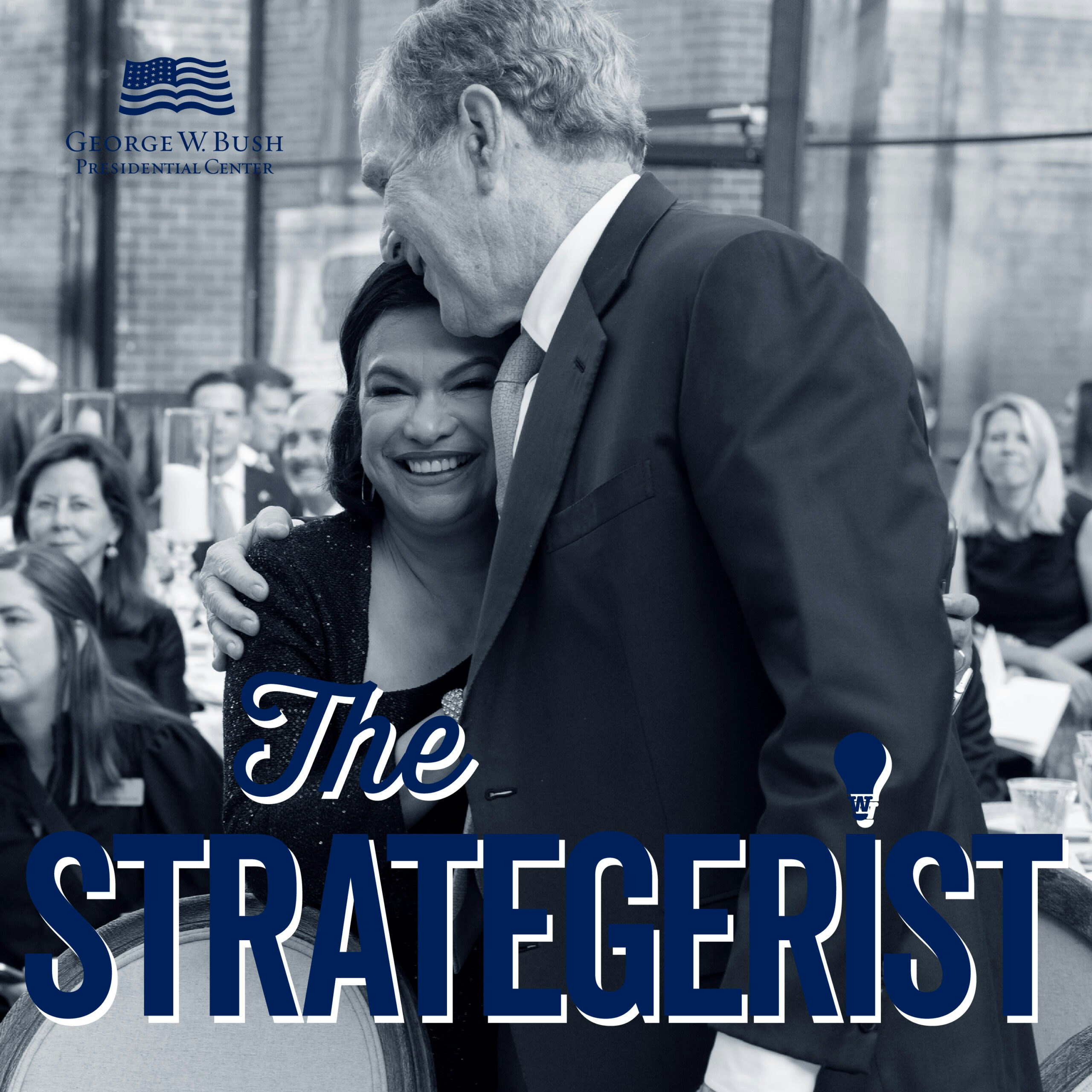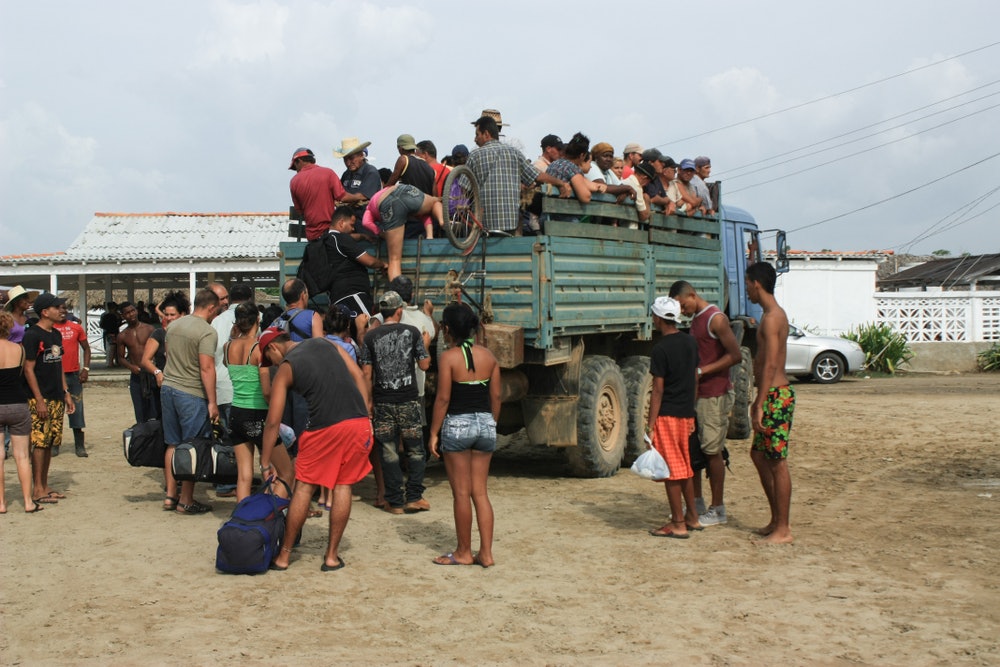In a recent conversation on immigration, Bush Institute Executive Director Holly Kuzmich sat down with Mario Lopez, President of the Hispanic Leadership Fund, to discuss the need to modernize our immigration system, the volume of misinformation around the issue of immigration, and more.
In this episode of Immigration Insights, Hispanic Leadership Fund President Mario Lopez discusses the need to modernize our immigration system and argues that our current system is disincentivizing legal immigration.
This episode of Immigration Insights is supported by Carnegie Corporation of New York.
Read the video transcript
Holly Kuzmich: Welcome back to Immigration Insights, a series from the George W. Bush Institute, where we talk to experts in different fields on the essential role of immigrants in the fabric of American society. I am Holly Kuzmich, executive director of the Bush Institute. Today I’m joined by Mario Lopez, president of the Hispanic Leadership Fund. Mario previously served in the US House of Representatives, is executive director of the Congressional Hispanic Conference, where he implemented communication and legislative strategies to foster prosperity through free enterprise. He worked with the White House, the executive branch agencies, the private sector and public policy communities. He served on the Hispanic Advisory Board for the Republican National Committee. He was a presidential appointee for George W. Bush. He’s a San Diego native. He was appointed by Orrin Hatch of Utah to the US Senate Republican Taskforce of Hispanic Affairs. Mario, thank you for joining me today.
Mario Lopez: Thank you, Holly. Great to be on.
Holly Kuzmich: So Mario, we have worked closely together on immigration reform, but you talk a lot about the need to modernize our current immigration system, calling it a hard truth and emphasizing the need for consensus among policy makers. Why do you see comprehensive reform as non-negotiable?
Mario Lopez: I mean, I would see reform in general as non-negotiable. I think that I’ve come around to the consensus view of these days that I think incremental changes are okay, and certainly it would be nice to think about if we can check a lot of boxes off in one piece of legislation, but I’m just not sure that that’s quite realistic these days. So even if it’s incremental changes that are made, I think that would be okay, but I think that the reason why it’s so important is just because our country stands to benefit just economically and in a myriad of ways, but also the cost of non-action is, I think, more division, more controversy and a lot of side issues that become controversial in and of themselves that would go away with proper reform.
Holly Kuzmich: So a lot of the… In terms of incremental reform, obviously a lot of the issues that come up on that are about dreamers, farm workers, TPS recipients. We also obviously have a lot of conversation about the border. But I want to talk to you a little bit about… We don’t often talk, though, that much about the current legal immigration system and the complexity of that system and the fact that we need to update it and the reverberating effects of our lack of updating the legal immigration system and what that does to pressures on the border and the challenges we face with the undocumented. Can you talk a little bit about the complexity of the legal immigration system?
Mario Lopez: Yeah, absolutely. And this topic overall, I mean, it’s obviously, as you well know, Holly, it’s multifaceted. Each facet is complex in and of itself. So that means that there are a lot of dimensions to just this very broad immigration topic. But I think that within that, I think not enough active advocates I see these days focus on the point that you just brought up. How complex and bureaucratic the system is for legal immigration. I mean, it can take 16 to 20 years to immigrate legally. The avenues for coming legally, a lot of people don’t know, they just assume, why don’t folks just get in line? Well, there is no real line. That’s just something that people say, but there is no actual line. Or why don’t they just apply from their home countries for a visa or for citizenship or for a green card
Well, it doesn’t work that way. There are no options for most people to do that. They have to fit into these predetermined boxes of if it’s an H-1A or H-2A visa or whatever these options are that are out there. So that creates a problem. It creates illegality. Now I want to be clear, it doesn’t excuse what individual people might do. We don’t want people to cross illegally and things like that. But as a country, we really hurt ourselves by not simplifying this system and not having these actual legal channels for people to come, because what happens is what we’re seeing now, where it’s a mess and people get frustrated with that.
Holly Kuzmich: And we often make the point that we don’t make it easy to legally come. We almost don’t give people a choice. People are not necessarily striving to come here illegally. Many want to come here and work and return home, but we really are just not giving them any options, and therefore… You hear this commentary from the American public, “I’m not for illegal immigration, but I’m for legal immigration.” Well, it’s a lot more complicated than that, and our system does not reflect making that a voluntary choice for people.
Mario Lopez: It disincentivizes legal immigration because of how difficult we make it to come legally. So again, that that doesn’t excuse individual choices that people make that we don’t… We’re not necessarily happy about. But it does mean that we should be smarter as a country to remove, reverse those incentives. Incentivize legal immigration, in addition to disincentivizing illegal immigration, and then you’ll have a more orderly legal flow of people who come here. And the most important thing about that is that it helps tremendously our security efforts against people who are actual bad guys, like cartels and those types of folks who we… I think that our resources at the border should focus on those folks, because that is a real threat, not an asylum seeker.
Holly Kuzmich: When you look at polls of Americans’ views on immigration, a majority of them recognize that our system needs to be reformed and are for it, but a lot of the public dialogue and inaction in Congress does not reflect the fact that we see broad support among the American people for immigration reform, and there’s a lot of misinformation out there. What do you see? What do you think is contributing to this?
Mario Lopez: Well, I mean, this is a fascinating dichotomy that you just pointed out, because while all the polling shows and more recent polling shows that support for immigration and immigrants has gone up, in fact, it’s at a historical high, that is amazing news, but it’s also juxtaposed with the fact that on the Republican side of the aisle, for example, on Capitol Hill, it seems like the opposite has happened. You have people questioning even people like dreamers and things like that, things that are low hanging fruit, that folks who didn’t do anything wrong themselves, and there still are voices who will deride them or denigrate them and refuse to act on constructive pieces of legislation that’ll help our country, help our economy. It’s a bit frustrating, but I think the fact is that we have truth on our side and that is a very powerful thing to have. So as long as we can, I think, focus on the aspects that I mentioned before about the legal immigration system and the benefits to our country, I think that that’s an important piece.
Holly Kuzmich: Have you seen attitudes shift as you’ve worked on this issue over the years in terms of where people are today versus where they might’ve been 10 or 20 years ago? Or do you think they’re in generally the same place and we just haven’t been able to act based on it?
Mario Lopez: I do think there has been some shift among voices, especially on the right that are a little bit more fervent about their anti-immigrant attitudes and their refusal recognize certain truths, but overall it’s not so much the number of voices, although again that is noticeable. I think that the voices are a little bit louder, and on the other side, the more pro-immigrant, the traditional mainstream conservative, Reagan, Bush camp sort of position, those folks do exist, but they’re just not as vocal. And I think that, again, the role for us as advocates and people educating on policy in this area, that’s something that we have to recognize and we have to work towards to help lift those people up and make sure that the pro-immigrant voices on the right especially are heard.
Holly Kuzmich: So Mario, you’re from San Diego, a border community. What do you think people misperceive about the border, border culture, what it’s like to be from a… What it’s like in a border community?
Mario Lopez: Yeah, absolutely. I mean, there are places just within a few blocks of where I grew up where, because of the elevation, you can look out and you can see the border, and at night, especially, you can see the different lights. You can tell which side is the US side and which side is the Mexico side. So yeah, I was right there. I think a couple important things. One, just culturally and from a personal perspective, I mean, I saw every day, whether it was my parents or other folks in the community, how hard these people worked, how dedicated they are to helping themselves and their families to providing a good education for their children. At the end of the day, that’s the… If you were to be able to pinpoint one predominant reason why people come, it’s for a better life for their children, not even for themselves. That’s okay, I’ll sacrifice whatever opportunity I have, but as long as my children have a better opportunity.
And that’s incredible. I mean, it’s really inspiring to see that, and that was something that always stuck with me and has motivated me throughout my life and my career, just to see how people are dedicated, how appreciative they are of the opportunities that they get in this great country of ours. And then on the political side, not just San Diego, but California overall, I came up and started really forthright in politics at a time when people… The governor of California, Pete Wilson, was really disparaging immigrants and targeting them in just very vicious ways. And I saw not just the damage that did to the community, but also from a political perspective, just how little support for him resulted out of that. I mean, we all know the proposition 187, 209 that stuff, and that became a real problem and something that I saw as a need to address, I think, on the right.
Holly Kuzmich: So COVID has particularly shined a light on immigrants’ role in our economy. What do you want policymakers to keep in mind as we come out of COVID and seek to revitalize our economy and rebuild our workforce in terms of the important role that immigrants play?
Mario Lopez: Well, yes. I mean, the pandemic has put front and center something that I referenced earlier about immigrants and constructive immigration reform. And that’s really about the needs, not so much for the immigrants themselves, although obviously they would benefit under positive reform, but it’s about the good of the country, because these people are contributing to our country, and the pandemic has highlighted that in the sense that essential workers, from people who work in grocery stores to medical professionals like doctors and nurses and everyone in between and along that spectrum, those are the people who kept this country going during the pandemic. And the data on this is absolutely clear. There are other people who can quote statistics and things better than I can, but it’s all out there, and it just shows the contributions again, that immigrants make.
And it stands in stark contrast to a lot of the extremist voices that are out there that are pushing bogus data and really faulty, illogical analysis about who these people are and what they’re doing and things like crime rates and welfare use. There’s all kinds of crazy things out there that need to be countered. But the good news, again, is that truth is on our side is just. It’s a powerful thing to have, but we have to do something with it as advocates and people who educate in this policy space.
Holly Kuzmich: Yeah. Well, Mario, thank you for all you’re doing on that front. I know it takes a united effort for all of us to be working together to push back on that misinformation, and as you say, get the truth out there, so thank you for everything you’re doing and thank you for joining me too.
Mario Lopez: Thank you, Holly. Appreciate it.
Holly Kuzmich: All right. Thanks, Mario.






























